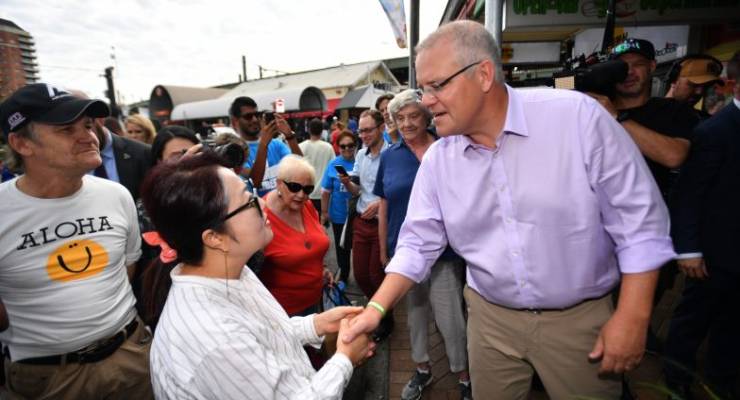
Always bet on self-interest: at least you know it’s trying.
— Jack Lang
There’ll be plenty of commentary in the weeks and months ahead suggesting Scott Morrison’s election shock win has a Trumpian quality. After all, he too, defied the pollsters to deliver a win for the right. He too made blatant and enthusiastic lying a key part of his campaign. He too was endlessly sneered at by elites, only to throw their condescension back in their faces on behalf of what he called “quiet Australians”.
It’s a useful analogy, but misleading. Morrison was the business-as-usual candidate in this contest, the one who promised to keep a system that was failing to deliver for voters ticking over. It was Labor that was promising to change the system, to make it start delivering for people who believed it had stopped delivering for them. It was Labor promising major change, offering to make a political-economic system devoted to servicing powerful vested interests instead operate for people who felt behind: workers who hadn’t had a pay rise for years, families struggling with health care costs, people who wanted a good education for their kids, taxpayers angry at a tax system in which they paid full freight while the rich and corporations got a discount, citizens who believed politics was corrupt, Australians who wanted action on climate change that had been stymied by powerful interests for too long.
It was Labor, not the government, that was accused of populism, of breaking faith with the neoliberal consensus.
But the electoral reaction to Labor’s program was hostile. Labor’s vote went backwards in every state except Victoria and South Australia, where both major parties recovered from the Nick Xenophon assault of previous elections. The result was worst in Tasmania where Labor fell (on current numbers) 3.9%, and Queensland, (3.4%). The Queensland result was an utter disaster for Labor, where it could be left with just five seats — a bad performance off an already low base.
The shift to the far-right there, with over 12% of voters going to Hanson or Palmer, was echoed in WA — 5.1% to One Nation and 1.9% to Palmer, and parts of regional NSW: One Nation picked up over 20% of the vote in Joel Fitzgibbon’s seat of Hunter and sent preferences to the Nationals, turning a safe Labor seat into a marginal (UAP picked up 4% too); One Nation picked up 14% in Paterson, and UAP picked up another 3.6%, slashing Labor’s majority. It continued, in part, a theme of the NSW state election, where One Nation prospered in coastal regional seats.
Voters who switch to Palmer and Hanson are typically driven there by disaffection with the political system, by a conviction that it’s no longer working for them, that they’ve been left behind by an economic and political order that serves others ahead of them. That is, the people whose interests were best served by Labor’s rejection of business-as-usual, and ostensibly most turned off by Scott Morrison’s promise of perpetuating the existing system, opted for the far right fringe first, and then preferenced the Coalition. It’s a devastating rejection of Labor and its program.
How Morrison — who gets full bragging rights for his amazing win, given its solo nature — achieved that will obsess psephologists and the now-discredited pollsters for a long time to come. But a working theory is that his relentless scare campaigns around Labor’s agenda of redistributive tax changes frightened voters away from Shorten, while the Coalition with its disunity and division made for only a second-best option after the appeal of Hanson and Palmer, who promise to entirely upend politics.
Whatever the case, the outcome is the maintenance of business-as-usual politics, the politics in which vested interests and influential groups will continue to get their way, in which the system will continue to deliver for the powerful at the expense of ordinary voters.
Are we getting three more years of business-as-usual politics? Write to boss@crikey.com.au with your full name to let us know your thoughts.








Crikey is committed to hosting lively discussions. Help us keep the conversation useful, interesting and welcoming. We aim to publish comments quickly in the interest of promoting robust conversation, but we’re a small team and we deploy filters to protect against legal risk. Occasionally your comment may be held up while we review, but we’re working as fast as we can to keep the conversation rolling.
The Crikey comment section is members-only content. Please subscribe to leave a comment.
The Crikey comment section is members-only content. Please login to leave a comment.